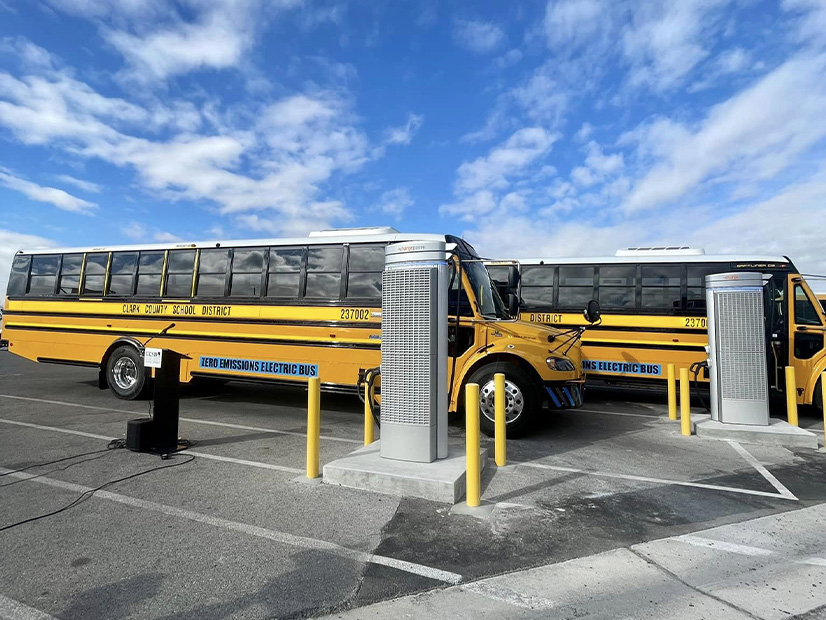
Nevada regulators on Thursday gutted NV Energy’s proposed $348 million transportation electrification plan, slashing the budget to about $70 million and removing most of its proposed programs.
The whittled-down plan, which the Public Utilities Commission of Nevada (PUCN) voted 3-0 to approve, has three programs. They include an interstate corridor EV charging program, an electric school bus vehicle-to-grid trial, and an innovation demonstration program that will provide matching funds for federal Inflation Reduction Act grants.
The proposed plan encompassed 10 personal and six commercial vehicle programs. Programs that the commission axed include a $5,000 EV purchase rebate for low-income residents, incentives for home charger installations, EV charging infrastructure programs for multifamily housing and workplaces, and transit electrification grants. (See NV Energy Seeking $348M for Transportation Electrification.)
Commissioners said the plan as proposed was too broad and that financial analysis, including impact on rates, was insufficient.
Another concern was what commissioners called a lack of progress on a previous NV Energy plan, the $100 million Economic Recovery Transportation Electrification Plan (ERTEP) that PUCN approved in late 2021. The three-year plan, which runs through 2024, aims to bring about 1,822 EV chargers to 120 sites throughout Nevada. (See NV Energy Gets Green Light for $100M EV Charger Plan.)
“The most recent update showed there was no progress made in actual implementation of the [ERTEP] programs,” Commissioner C.J. Manthe said on Thursday. “At the end of 12 months, there was only program administration costs that were expended.”
Commission Chair Hayley Williamson also noted NV Energy’s lack of spending thus far on the ERTEP programs. Still, she said, the transportation electrification plan that the commission approved on Thursday is significant.
“Despite some of these programs being deferred or rejected, this is still an approximately $70 million budget for transportation electrification, which is clearly important to the commission,” she said.
NV Energy was required to file ERTEP and the more recent transportation electrification (TE) plan by Senate Bill 448, passed during Nevada’s 2021 legislative session. The company filed the TE plan as part of the third amendment to its 2021 integrated resource plan. The TE plan covers 2023 and 2024; an updated plan will guide transportation electrification programs after that.
NV Energy Response
In a statement provided to NetZero Insider after the PUCN vote, NV Energy said, “We are currently evaluating the details of the commission’s order.”
But in a Feb. 24 filing, NV Energy responded to criticisms that have been raised since the TE plan was filed in September.
The TE plan is complementary to the charging-station-focused ERTEP, the company said, bringing transportation electrification programs to most of its customer classes. With its broad scope, the plan is intended to fulfill the intention of SB 448, NV Energy said.
“To be clear, the direction from the legislature was not just to prepare for future electric vehicle adoption or to keep up with resulting load — it was to accelerate transportation electrification in this state,” the company said in its filing.
NV Energy said it provided information related to its TE plan “well in excess of” the requirements of SB 448. And regarding progress on ERTEP, the company said it is not behind schedule.
“ERTEP is in year one of a three-year plan,” NV Energy said.
Clean transportation advocates said Thursday that the PUCN decision leaves “gaping holes” in the state’s EV policies. They said support is particularly needed for residential and commercial customers who want to install EV chargers at their homes or businesses.
“Leaving out residences, particularly multi-family homes, is a huge, missed opportunity,” Joe Halso, staff attorney with the Sierra Club, said in a statement. “What has been approved today is far from the holistic support necessary to meet EV drivers’ needs and improve access to clean transportation options for all Nevadans.”
Program Details
The TE plan’s interstate corridor charging depot program is an expansion of a program contained in ERTEP. Charging sites would feature two Level 2 chargers, six DC fast-charging ports and shade canopies, although NV Energy said site hosts could request fewer chargers.
NV Energy will offer site hosts an incentive for each charging port, with higher amounts for sites in disadvantaged communities. With a $23 million budget, the program is expected to support 10 charging sites with 80 charging ports.
The electric school bus vehicle-to-grid trial is also an extension of an ERTEP program. NV Energy is looking for about nine school district sites — two large and seven small — to participate in the trial, in which energy will be discharged from electric buses during peak periods. Priority will be given to rural school districts.
The $32 million program is expected to support about 110 charging ports at nine sites.
PUCN also approved $1 million that NV Energy can use as matching funds if it secures federal grants under the Inflation Reduction Act.



